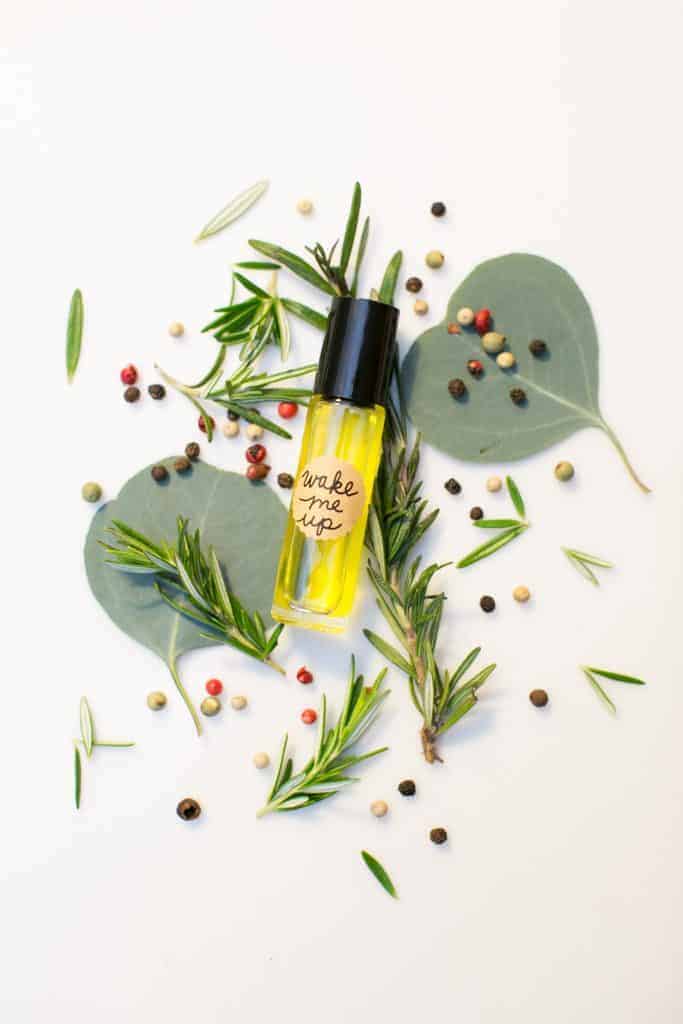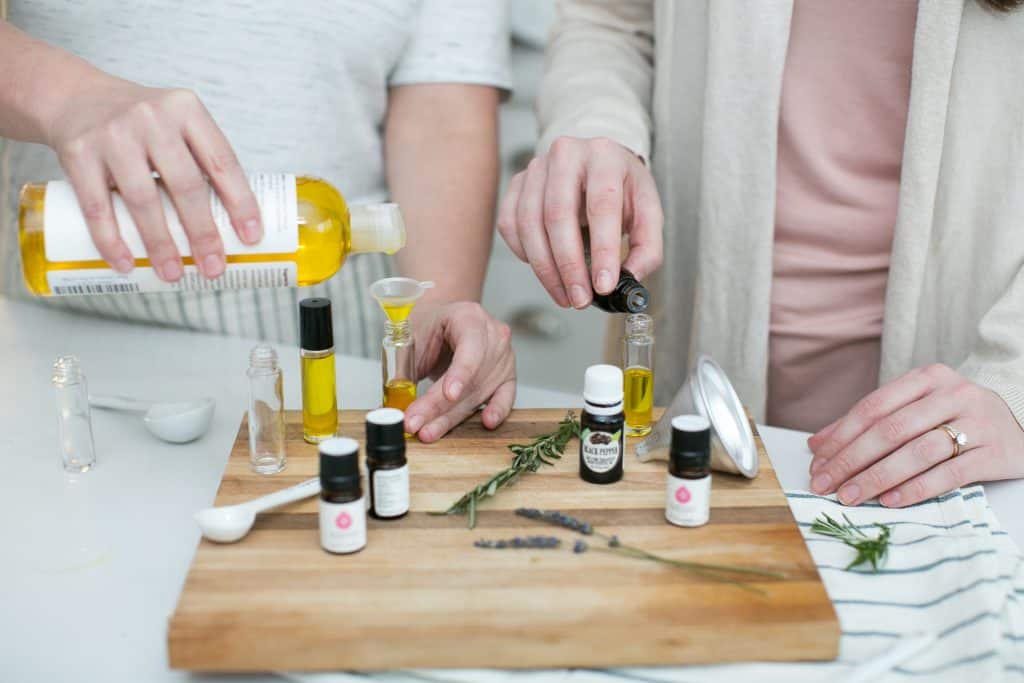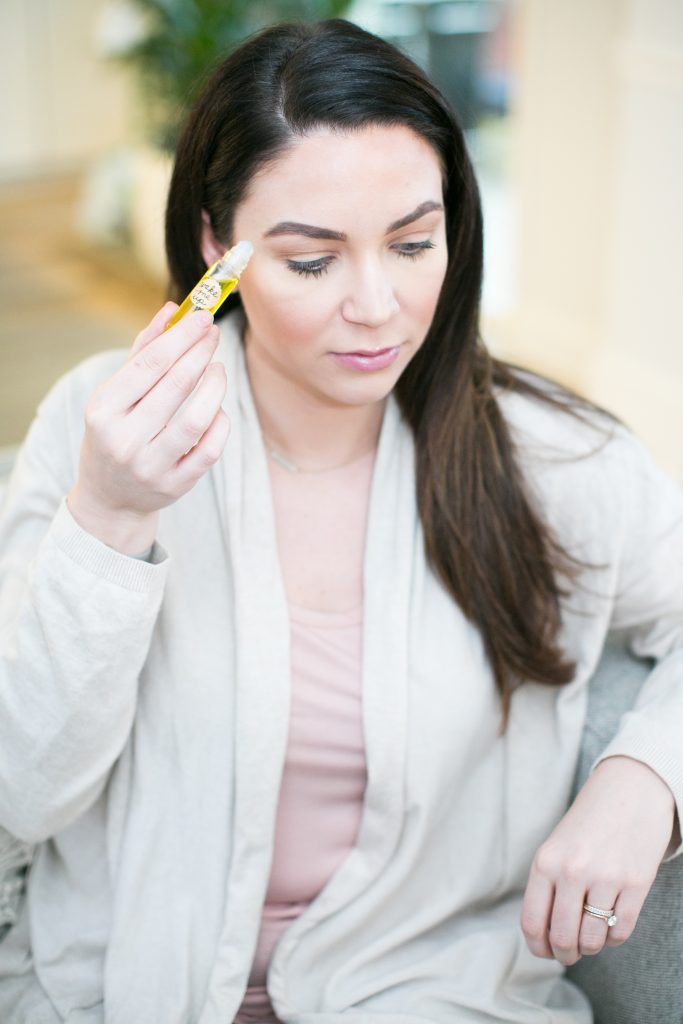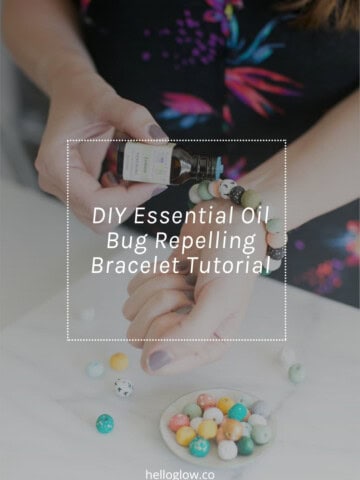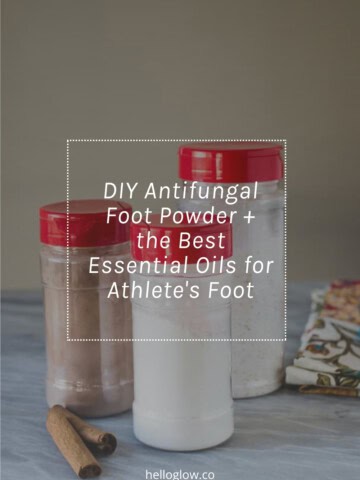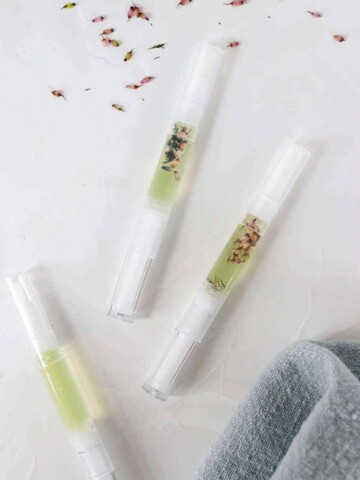When I took aromatherapy last summer, we started each class by studying the scent of a different essential oil. We'd take a minute just breathing in an oil with our eyes closed, and then we'd write down adjectives for the scent, how it made us feel emotionally, and where we felt it physically. This is when I fell in love with rosemary essential oil.
It was fascinating to study an oil closely and focus on its mind/body effects. Conifer oils like pine and juniper created a strong, stable feeling, while citrus oils like lemon and sweet orange brought up cheerful and bright emotions.
But it was rosemary (Rosemary officinalis ct. 1,8 cineole) that became one of my favorite scents. Smelling less medicinal than tea tree or eucalyptus, the rich, woodsy aroma of rosemary brings a sense of focus and awakening [source].
You feel it in your lungs and breath and throughout the rest of the body. Rosemary essential oil can be used in a variety of ways, like headaches or your hair.
Rosemary is sold with different chemotypes, which basically means that rosemary grown in different places can have a different chemical makeup. The cineole chemotype is often used for the respiratory system.
You'll also see rosemary ct. camphor, which is traditionally used for increasing circulation. Both types are stimulating and energy-boosting. This post breaks down the types in more detail.
There are so many ways to harness the power of rosemary essential oil; you can make a simple rosemary roll-on to use for just about any ailment!
All About Rosemary Oil
Rosemary oil is an essential oil derived from the rosemary herb. It has been used for centuries for various medicinal and culinary purposes. The oil is extracted from the leaves of the rosemary plant through steam distillation. Rosemary oil is known for its distinct, woody aroma and is commonly used in aromatherapy and skincare products.
One of the main benefits of rosemary essential oil is its ability to improve mental clarity and focus. The scent of rosemary oil has been shown to increase alertness and improve cognitive function, making it a popular choice for use during studying or working.
Rosemary oil also has anti-inflammatory and analgesic properties, which make it useful in treating muscle pain and soreness. It can be applied topically to the affected area or added to a warm bath for an overall relaxing experience.
In addition to its physical benefits, rosemary oil is also known for its emotional and spiritual benefits. It is believed to have a calming effect on the mind and body, promoting feelings of relaxation and reducing stress and anxiety. It is also said to promote feelings of love and compassion.
Rosemary oil is a versatile oil that can be used in a variety of ways. It can be added to a diffuser for aromatherapy purposes, used as a massage oil, or added to skincare products for its anti-inflammatory properties. It can also be added to shampoos and conditioners to promote healthy hair and scalp.
Overall, rosemary oil is a powerful essential oil with many benefits for the mind, body, and spirit. Its distinct aroma and numerous properties make it a popular choice in aromatherapy and natural health remedies. So, if you're looking for a natural way to improve your mental clarity, reduce muscle pain, or promote relaxation, try incorporating rosemary oil into your daily routine.
9 Rosemary Essential Oil Rollerball Blends
Essential oil roll-ons are one of my favorite things to make as they have so many uses—especially those that include rosemary! They take approximately 60 seconds to put together, and you can use them for just about anything.
It's also one of the easiest ways to make your own essential oil perfume. We made a wake-up blend that is perfect for your morning routine or if you've hit the afternoon slump. Here's what you need to make an essential oil roll-on:
—10 ml roller ball applicators
—About ⅓ of an ounce of carrier oil—I like fractionated coconut oil, but olive oil, jojoba, or sweet almond will all work
—10–15 drops of essential oils
—A measured dropper or pipette makes measuring much easier
—And a tiny funnel makes pouring less messy
Remove the cap and plastic-encased roller-ball insert from the 10 ml empty roll-on bottle. Add the essential oil drops. Use a max of 15 drops per 10 ml for up to a 5% dilution.
Fill the remainder of the 10 ml roll-on bottle to just under the neck of the glass with the carrier oil. Then replace the roll-on insert, and press firmly until the plastic is seated against the glass.
Shake the roll-on bottle to thoroughly mix the blend, replace the cap, and tightly secure until ready to use.
To use, roll the bottle between your hands to remix and warm the oils. Then apply to pressure points on the body, such as the temples, sides of the neck, behind the ears, bottoms of the feet, and insides of the wrist.
We've put together several rosemary essential oil blends you can try. Before making the roll-on, gather all of the essential oils in your hand (with the caps off) and breath in the combined scent.
If you like it, great! If not, take out the oil that offends your nose, and adjust the blend and number of drops (instructions here). Most of these blends have 15 drops of essential oil, so if you don't happen to have one of the oils that only need 1–2 drops, just leave it out and see how you like the aroma combination.
One note on safety: Make sure to always dilute your essential oils in this way before applying to the skin. Avoid using rosemary essential oil during pregnancy, for those with epilepsy, or with children under the age of 10, or with those with epilepsy.
12 Rosemary Roll-On Blends
1. Wake Me Up
- 2 drops black pepper
- 5 drops bergamot
- 3 drops rosemary
- 3 drops juniper
- 2 drops eucalyptus
2. Immune Defense
- 1 drop cinnamon leaf
- 1 drop clove bud
- 3 drops eucalyptus
- 3 drops rosemary
- 6 drops sweet orange
3. Immune Defense #2
- 2 drops rosemary
- 4 drops lemon
- 2 drops eucalyptus
- 3 drops frankincense
- 4 drops sweet orange
4. Breathe Easy
- 4 drops rosemary
- 4 drops eucalyptus
- 2 drops peppermint
5. Breathe Easy #2
6. Aches + Pains
7. Aches + Pains #2
- 4 drops ginger
- 4 drops rosemary
- 4 drops eucalyptus
- 3 drops lavender
8. Headache Soother
- 2 drops eucalyptus
- 4 drops lavender
- 1 drop peppermint
- 2 drops rosemary
- 3 drops basil
- 2 drops sweet marjoram
- 1 drop vetiver
9. Confidence
- 4 drops lavender
- 3 drops patchouli
- 4 drops bergamot
- 1 drop clary sage
- 3 drops rosemary
10. Concentration
11. Concentration #2
- 6 drops sweet orange
- 5 drops rosemary
- 4 drops peppermint
12. Burnout
- 4 drops bergamot
- 2 drops rosemary
- 3 drops balsam fir needle
- 3 drops Scots pine
- 3 drops Mandarin orange
Additional Uses For Rosemary Oil
Rosemary oil is a versatile essential oil with a range of uses. Here are some of the ways in which rosemary oil can be used:
- Aromatherapy: Rosemary oil is a popular choice in aromatherapy due to its fresh, invigorating scent. It is often used in diffusers, sprays, and candles to create an uplifting and energizing atmosphere.
- Hair care: Rosemary oil is believed to stimulate hair growth and improve the overall health of the scalp. It can be added to shampoos and conditioners or used as a scalp treatment.
- Skin care: Rosemary oil has antimicrobial and anti-inflammatory properties that make it useful for treating acne and other skin conditions. It can be added to face masks or used as a spot treatment.
- Pain relief: Rosemary oil has analgesic properties that make it useful for relieving headaches, muscle pain, and joint pain. It can be applied topically or added to a warm bath.
- Cooking: Rosemary oil is a popular ingredient in Mediterranean cuisine and can be used to flavor meat, vegetables, and baked goods.
- Cleaning: Rosemary oil has antimicrobial properties that make it useful for cleaning surfaces and eliminating odors. It can be added to homemade cleaning solutions or used in a diffuser to freshen the air.
- Bug repellent: Rosemary oil has insecticidal properties that make it an effective natural bug repellent. It can be added to sprays or used in a diffuser to keep insects at bay.
- Respiratory health: Rosemary oil has expectorant properties that make it useful for relieving respiratory symptoms such as congestion and coughing. It can be added to a steam inhalation or used in a diffuser.
- Memory and concentration: Rosemary oil has been shown to improve memory and concentration. It can be used in a diffuser or applied topically to the temples.
- Mood enhancement: Rosemary oil has a refreshing and uplifting scent that can help to improve mood and reduce stress. It can be used in a diffuser, added to a warm bath, or applied topically to the wrists and neck.
Bonus Recipe: Rosemary Oil Roll-on For Hair Growth
Rosemary oil has been shown to stimulate hair growth, and using a roll-on application allows for targeted and easy application to the scalp. The addition of other essential oils can also provide additional benefits and a pleasant aroma. This DIY rosemary oil roll-on can be a great addition to your hair care routine. You'll need:
- 10 drops pure rosemary essential oil
- 5 drops of a blend of aromatherapy essential oils (such as lavender, peppermint, or lemon)
- 1 tablespoon of carrier oil (such as jojoba oil or almond oil)
- A small roll-on bottle
Instructions:
- Add 10 drops of pure rosemary essential oil to the small roll-on bottle.
- Add 5 drops of the blend of aromatherapy essential oils to the bottle.
- Fill the bottle with 1 tablespoon of carrier oil.
- Close the bottle and roll it between your hands to blend the oils.
- Apply a few drops of the oil blend onto your scalp and massage gently with your fingertips.
- Repeat this process daily to promote hair growth and strengthen hair follicles.
This post was medically reviewed by Dr. Holly Smith, a board-certified physician in nephrology and internal medicine with a background in nutrition. Learn more about Hello Glow's medical reviewers here. As always, this is not personal medical advice, and we recommend that you talk with your doctor.
181
